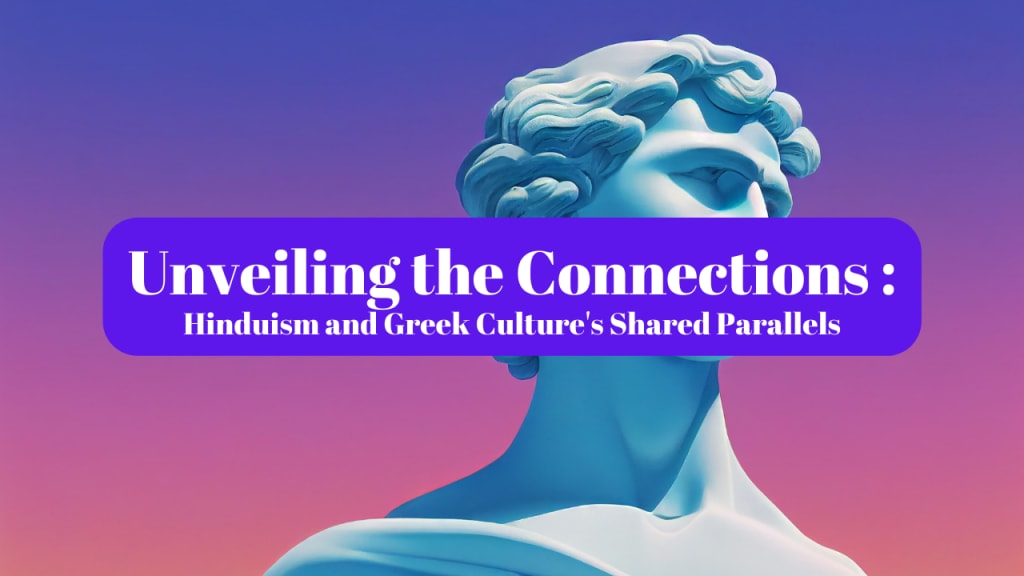Content warning
This story may contain sensitive material or discuss topics that some readers may find distressing. Reader discretion is advised. The views and opinions expressed in this story are those of the author and do not necessarily reflect the official policy or position of Vocal.
Unveiling the Connections
Hinduism and Greek Culture's Shared Parallels

Hinduism and Greek culture, two ancient belief systems, have long captivated people's imaginations with their rich mythology and profound teachings. While seemingly distinct, these traditions share fascinating similarities that hint at common origins or cultural exchanges. This article explores ten compelling parallels between Hinduism and Greek culture, spanning gods and goddesses, legendary tales, heroic figures, and cultural motifs. From the stories of Kansa and Cronus to the gods Indra and Zeus, and the goddesses Usha and Eos, these narratives showcase the universality of human fascination with divine powers.
Kansa and Cronus: Battling Fate :
The tale of Kansa, the tyrannical ruler in Hindu mythology, mirrors the Greek myth of Cronus. Both figures were driven by the fear of their prophesized downfall caused by their own offspring. Kansa killed Devaki's seven children, while Cronus devoured his newborns. In both stories, the prophecies came to pass as Krishna and Zeus emerged to overthrow their oppressive fathers, underscoring the triumph of good over evil and the ultimate fulfillment of destiny.
Goddess Usha and Eos: The Radiant Dawn :
Goddess Usha, revered in Vedic literature, symbolizes the dawn. Described as a youthful, radiant woman traveling in a golden chariot, she banishes darkness and brings light to the world. Greek mythology features a similar figure in Eos, the goddess of dawn. Depicted in Orphic Hymns, Eos also traverses the sky in her chariot, heralding the arrival of her brother, the sun-god Helios. The parallel in the names, meanings, and depictions of both goddesses highlights the shared cultural reverence for the dawn and its transformative power.
Indra and Zeus: Kings of the Gods :
Indra, a prominent deity in Hinduism, and Zeus, the central figure in Greek mythology, both hold the title of king of the gods. Both figures faced conflict with their fathers: Zeus overthrew Cronus, while Indra prevailed over his father Tvashta. Furthermore, the gods' thunderbolt weapons—Indra's vajra and Zeus' thunderbolt—underscore their parallel roles as wielders of celestial power. These resemblances hint at cultural exchanges or shared human experiences that led to the conception of such powerful and authoritative divine figures.
Immortality: Ambrosia and Amrit :
In Greek mythology, the gods achieve immortality by consuming ambrosia, a divine substance. Similarly, Hindu mythology speaks of amrit, a nectar that grants immortality to gods and grants them eternal life. Both concepts highlight the shared human desire for eternal existence and transcendence beyond mortal boundaries. The symbolism of divine nectar found in both traditions suggests a universal yearning for immortality and the elevation of the human spirit.
Yamaraj and Hades: Rulers of the Underworld :
Yamaraj, the god of death in Hinduism, and Hades, the Greek god of the underworld, share striking similarities. Both deities oversee the afterlife and decide the fate of souls, determining their passage to heaven or hell. Yamaraj is accompanied by two dogs, Sharvara and Syama, while Hades is accompanied by Cerberus, a multi-headed dog. The resemblance between these underworld guardians reinforces the universal concept of divine judgment and the presence of protective beings in the realm of the afterlife.
Achilles and Arjuna: Heroic Warriors :
The stories of Achilles in Greek mythology and Arjuna in the Mahabharata, the epic Hindu text, showcase remarkable parallels. Both were legendary warriors blessed with extraordinary prowess and faced internal conflicts before engaging in great battles. Arjuna's dilemma on the Kurukshetra battlefield mirrors Achilles' hesitation and fear of the outcome of war. Additionally, their invulnerability in battle—Achilles with his armor and Arjuna with his divine weapons—emphasizes their similarities as heroic figures who strive for honor, glory, and the triumph of righteousness.
Conclusion :
The remarkable parallels between Hinduism and Greek culture highlight the universality of human experiences, aspirations, and the age-old fascination with divine powers. From shared narratives of prophecy and triumph over oppressive rulers to the personification of cosmic forces, these connections bridge cultures and emphasize the common threads that unite humanity.
About the Creator
Mahamud Hayet Arpon
I am a versatile and talented writer with a passion for storytelling. Born with a vivid imagination and a love for words, I embarked on a literary journey that has shaped their identity as a writer.






Comments
There are no comments for this story
Be the first to respond and start the conversation.